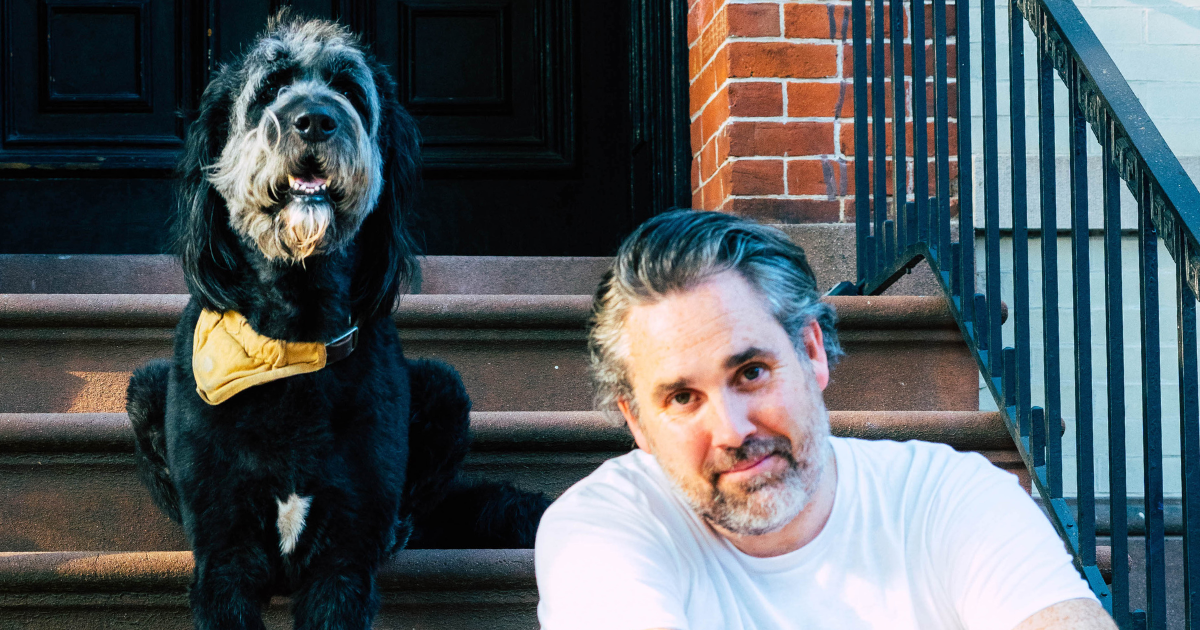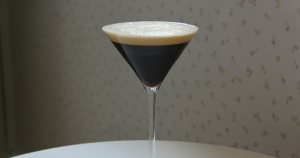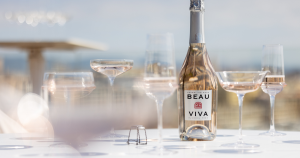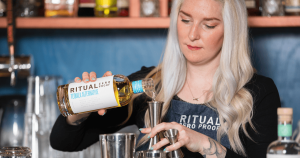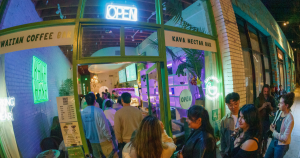Mikey shares his journey from a seasoned bar industry professional to the non-alcoholic beer space. This transition, spurred by the birth of his son, reflects a deep personal commitment to creating a more inclusive drinking culture. Mikey discusses the challenges of crafting a non-alcoholic beer that rivals traditional brews in taste and quality, plus his vision for making non-alcoholic options a norm in social settings.
What inspired you to transition from a successful career in the bar industry to founding a non-alcoholic beer?
I had been working in the hospitality and bar world for more than half my life; I started as a glass collector whilst at university in Glasgow, Scotland and I finished with opening The Spaniard in the West Village. The pandemic obviously gave me time to reassess, but the more significant change was the start of my family. I’ve known my wife, Jess, since I moved to New York City in 2007. She was a regular at my first bar, Bua. After reconnecting in 2017, we were very fortunate to welcome a son to the world in 2021.
Our son was born with a congenital heart defect known as Hypoplastic Left Heart Syndrome (HLHS), which basically means he was born without the left side of his heart. The treatment for this is three stages of surgeries. Within the first six months of his life, he went through the first two of these open-heart procedures.
My son’s diagnosis was the real catalyst for me to take a different path. I didn’t want to leave the bar and hospitality industry completely, though, and I had long had my eye on the growth of the non-alc category as a whole. I felt I could help and contribute to its future. I also know that alcohol won’t play a significant role in my son’s life as he gets older, due to his condition. So, I wanted to focus on helping normalize and promote non-alc beer in the hospitality world. I want it to feel as commonplace as going out for a normal beer.
That’s a touching motivation, normalizing non-alcoholic options with your son in mind. As you moved into the non-alc space, how did your experiences in various roles within bars influence the direction of your brand?
I think the first thing was breaking down the stigma of non-alc beers. Ten years ago, non-alc beer was still an afterthought for many bar owners. They just ordered whatever one the distributor had. The idea of non-alc beers tasting good, looking good, and feeling like they belonged on the menu didn’t come into play. It was a throwaway.
Since then, that trend has been changing slowly—and it’s sped up in the last five years or so. The same care and thought that bars and restaurants place on their food, beer, cocktail, and wine selections is also going into their non-alc offerings. I wanted to create a non-alc beer that for all intents and purposes looked, felt, and tasted like a full-strength beer.
Going out, socializing, etc. are synonymous with drinking. And you feel self-conscious if you aren’t drinking and are knocking back ginger ales instead. I wanted to build a brand that helped break down barriers and create more options for customers. I wanted to create something that beverage directors and everyday consumers would appreciate. That belonged on the menu as well as in your fridge.
From working in the bar world, I feel I have a good understanding of what customers expect when it comes to certain drinks and styles, and what they enjoy. At the end of the day, the customer is king. Whilst you might think an idea is great, the customers will be the ones to let you know if they share that view.
My whole career has been in the bar world, and I love everything that bars offer. Alcohol is obviously one of the main components of that world. There is no denying that alcohol makes bars a great place to be, but it’s also the cause of many of the problems that bars have to deal with. I’ve seen this firsthand for over 20 years. So, to be able to offer a different option is not only good for individuals, but I also see it as great for bars.
That makes a lot of sense. What were the initial challenges you faced in developing a non-alcoholic beer that met your standards for taste and quality?
In trying numerous non-alc beers, the one thing that always stood out to me and our Head Brewer, Dylan Collins, was the mouthfeel. Alcohol is an ingredient that creates a certain taste and sensation in your mouth. In fact, flavor binds to alcohol, helping with the taste.
Without alcohol, then, you’re missing a key component—the flavors have been recreated, but the mouthfeel is missing. That gap was our focus from the start, to try to create something that matched beer in every way. From the outset, Dylan and I set out not to make a great non-alc IPA, but instead to make a great IPA that just happens to also be non-alc.
Can you share insights into your brewing process and how it differs from traditional beer brewing?
In creating our non-alc IPA, we embrace the very same ingredients and processes that are utilized to brew conventional (alcoholic) beer, albeit with some slight but critical changes.
For example, key conditions are manipulated in the brewhouse in order to create a wort with a particular sugar composition. It lends itself to a fermentation that produces complex flavors and aromas, but doesn’t drive the ABV above 0.5%. We’re certainly brewing beer. It just so happens to be non-alcoholic beer.
How has the reception been from both the non-drinking community and traditional beer enthusiasts?
So far it’s been tremendous. I’m very fortunate to be able to call on a few industry veterans to give me their honest feedback, but the response from consumers has also been terrific—exactly what we were hoping for.
We’ve been embraced by many bars and restaurants in New York City, which is great. We’ve also had people reaching out from Texas, Pennsylvania, Ohio, and California about stocking us, which is beyond our expectations.
It shows that non-alc’s growth is not just a trend. It’s a category that’s here to stay.
In what ways do you think your non-alcoholic beer can contribute to a culture of acceptance and inclusivity in bars and social gatherings?
In addition to the recipe development, we put a lot of thought into the design of the cans. We want the can to feel like it belongs in all social settings where beer is usually found. We want the taste to be indistinguishable from conventional (alcoholic) beer. We want to encourage people to switch their usual beer of choice with Good Time (or alternate between them), whether it’s for one drink, one night, one month, or every night.
We’ve also been encouraged to see that there’s a generational acceptance of non-alc drinks. This is something that really encourages me. I want my son to see non-alc beer as being ever-present in social settings. If his older cousins, aunts and uncles, parents and grandparents are enjoying it, then it will only help. We weren’t as fortunate growing up to see non-alc options being enjoyed in social settings. So, I would love to contribute to that change.
What role do you see Good Time Brewing playing in the evolving landscape of social drinking in the future?
One of our goals is to make non-alc draft beer commonplace in bars and restaurants. I think draft beer is synonymous with going out, and draft beer usually doesn’t have a label whilst you drink it. That anonymity will make it a lot easier for people to make the decision to consume non-alc beer more often. It also allows people to consume non-alc beer in a new—and delicious—way.
We’re currently trialing a non-alc draft at The Spaniard in the West Village for the month of January, and we encourage everyone to try it and give us their feedback. We’re also working on our Pilsner and Wheat beer options, which will be available soon.
We’ve focused our attention on places that are synonymous with beer. We want people to know that wherever you expect to find beer you’ll also find a Good Time. Whether that’s at bars, comedy clubs, sitting on the stoop, or a family dinner.
Love it! Is there anything else on the horizon for Good Time that you can share with us?
Our finale to Dry January is quickly approaching. Good Time Brewing is hosting a live music event at Baby’s All Right (146 Broadway) on January 31, in which we’ll have live music and non-alc beers, cocktails, and wines.
We’ve partnered with other great non-alc brands like NON Wines, Antidote, The Pathfinder, and Curious Elixirs to throw this party. It’s part celebration of Dry January, part to show that the non-alc options out there now are incredible. We want people to know: if you’re choosing not to drink, for whatever reason, then that shouldn’t stop you from having a good time.
Tickets are available here
Dry Atlas is a media company focused on alcohol alternatives. We deliver non-alc insights, news, and recs to over five million people annually. To stay up to date on all things non-alc, subscribe to our weekly newsletter.


